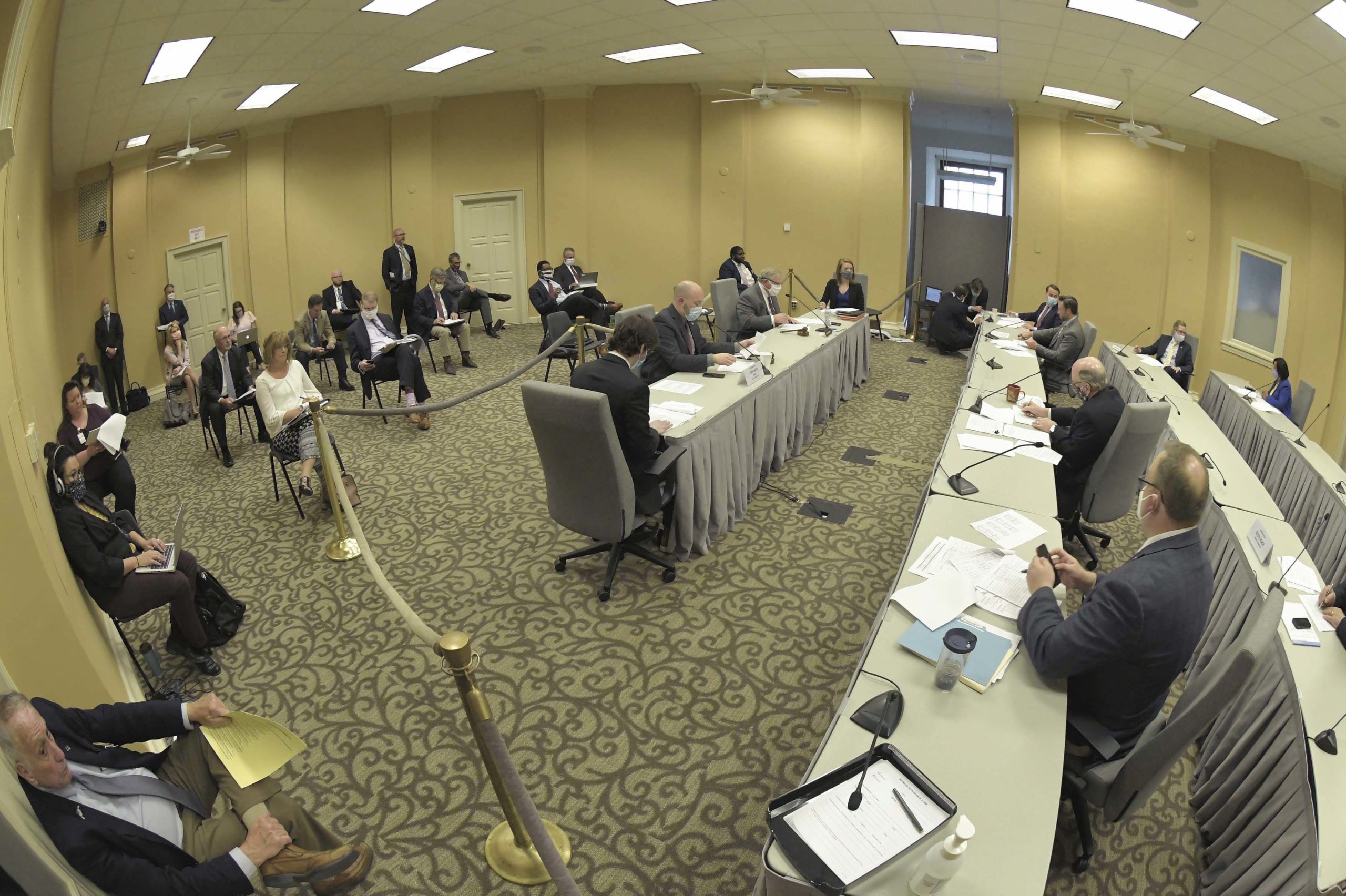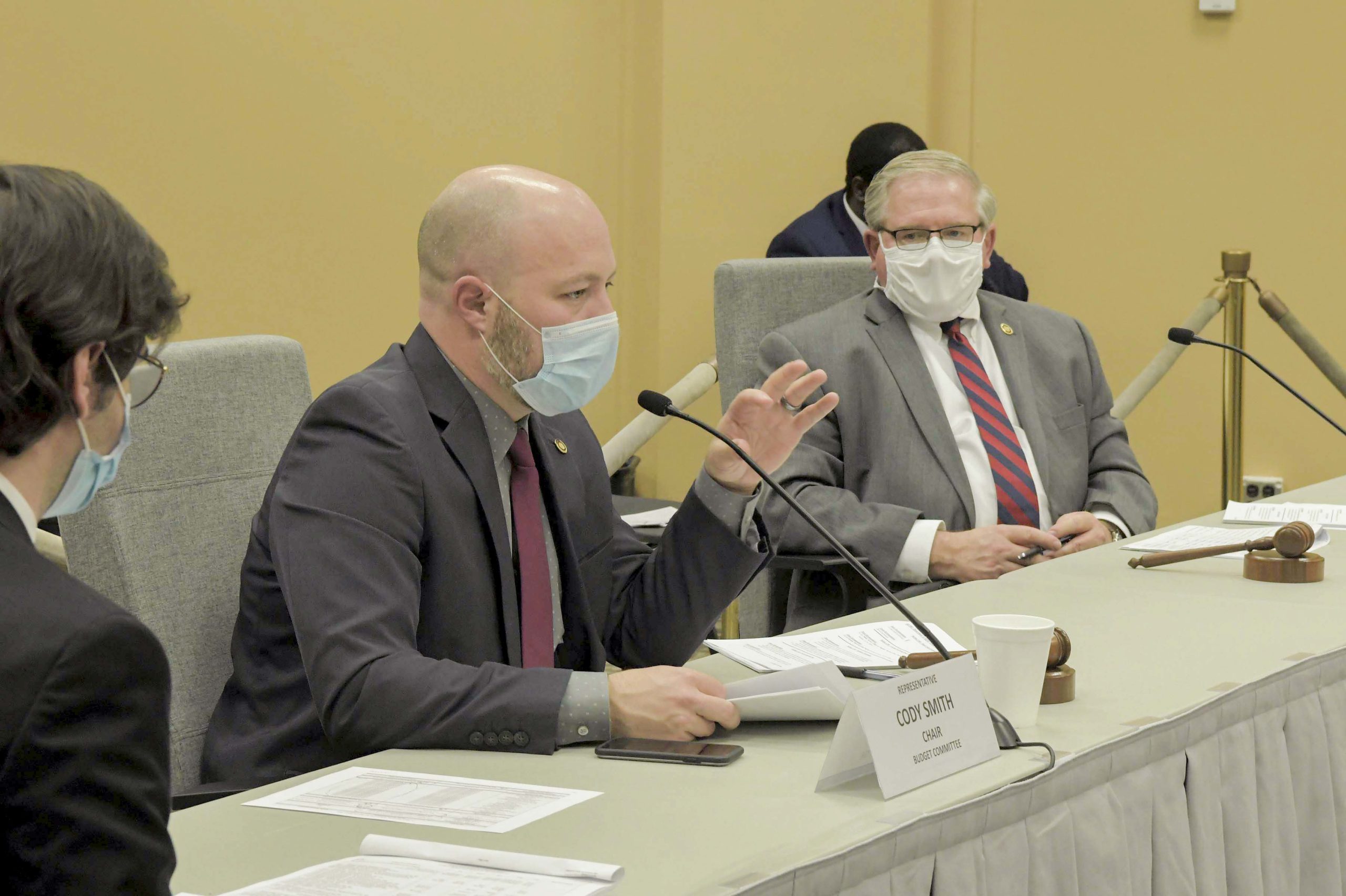JEFFERSON CITY, Mo. — In the midst of a global pandemic, Missouri lawmakers returned to the capital city and passed a budget package just under the wire Friday.
“It’s a tough year. We all know the economy has taken a bit of a turn from January, and we’re having to address this right now,” Sen. Dan Hegeman, chair of the Senate Appropriations Committee, said.
Both chambers passed the budget by 3 p.m. Friday, the constitutional deadline for doing so. It’s likely lawmakers will need to return to the Capitol later this year for further appropriations, especially as more federal money becomes available.
The Budget Conference Committee — made up of lawmakers from both chambers — met Thursday evening to hammer out the details of the $35 billion Fiscal Year 2021 budget after an eight-hour delay. It took four hours and just a bit of debate to close on the budget.
The total budget is $35,291,459,657:
- General Revenue — $10,011,743,473
- Federal — $14,757,315,949
- Other — $10,522,400,235
Here’s a look at several key takeaways from the budget.
Higher Education
Although the House made cuts to higher education institutions, the appropriations were restored under the Senate’s plan.
The House’s 10 percent cut to two-year community colleges was restored. But the restoration for four-year institutions is contingent upon federal money becoming available.
House Budget Chair Cody Smith said there’s an “avenue under the right conditions” for the cuts made to higher education to be restored.
Conservation food relief program
One of the biggest fights in the Budget Conference Committee was over appropriations to the Conservation Department’s Share the Harvest Program. The program provides venison to those in need through a partnership with the Conservation Federation of Missouri, a private organization.
Rep. Robert Ross won out on this item. The budget amps up the appropriations for this program to $300,000 — but eliminates the federation’s direct involvement. However, Ross said the federation could contribute on its own.
Sen. Mike Cunningham decried the changes, noting while the department had $150,000 to spend last year, the federation put in an additional $450,000.
“I think this is the wrong direction to go during this time,” Cunningham, a Republican, said.
Aside from venison, the program will now include feral hogs.
On the floor Friday, Hegeman noted the Conservation Department’s budget was “the most contentious department bill throughout the process.” The Senate had to “work hard to strike a compromise” on this bill, he said.
Virtual education program
Compromise language for a virtual education program was struck in the Conference Committee. After some back-and-forth, the budget includes $500,000 for a statewide competitively bid virtual education program conducted by a public K-12 institution.
The original Senate position earmarked the funds for the Springfield Public Schools which already has a robust virtual education program. The compromise language means any public K-12 school that designs a virtual education program can bid for the funds.
Tourism
Although Hegeman and Smith came to conference with a compromise over the Tourism budget (about $15.5 million), the funding was amped up even more after several senators, including Sen. Gina Walsh, made the argument that once the economy reopens, people might be more apt to travel by car than by plane. Adding to the Tourism budget would make Missouri more competitive compared to its neighboring states, senators said.

Hegeman sided with his colleagues, noting money was saved in other areas. The new compromise raised the budget to about $18.5 million.
Noting it was her last year helping with the budget process as a senator, Walsh said she was glad to see the Tourism budget “do a little better than it did 16 years ago.”
Amtrak
Funding for Amtrak’s Core budget reduced by $1.1 million in the budget, causing consternation among a few during conference. To make up for the budget reduction, Hegeman suggested the River Runner go to a once-a-day service as opposed to twice-a-day as it is now.
Reps. Peter Merideth and Kip Kendrick argued Missourians use the twice-daily service to travel between cities within the state for day trips and gutting it could impact tourism.
“It’s a real problem that could hurt both ridership and solvency down the road on top of arrearage,” Merideth said.
FTEs
Sen. Denny Hoskins championed cutting empty full-time equivalents, or FTEs. The positions were “longstanding” unfilled, Hegeman noted during conference.
While several state departments had FTEs cut, the Department of Transportation (MoDOT) saw the most. The budget eliminated 31 open FTEs, totaling about $1.4 million, from the department.
Merideth and Kendrick raised concerns about the FTE cuts, noting Missouri’s economic situation given the pandemic. Kendrick said it might be easier to “fill those positions in a less-tight labor market when there’s going to be an abundance of individuals looking for employment.”
“It might be the opportune time to hire some people to fill those spots,” he said.
Food supply production
Thanks to Sen. Justin Brown, the budget includes a provision allocating $20 million of federal coronavirus relief funding to aid livestock producers and food processing facilities impacted by the pandemic. The funding, for smaller operations, is to increase processing capacity and enhance worker safety, among other things.
“It’s imperative that we provide the resources necessary to keep these facilities open and our food supply secure,” Brown had said. “This funding will allow producers and processors to adapt to the rapidly evolving coronavirus crisis.”
St. Louis programs
Sens. Brian Williams and Jamilah Nasheed went to bat for St. Louis-area programs in the Conference Committee.
Williams successfully argued for the one-time appropriation of $200,000 be put back in the budget for the St. Louis YouthBuild’s Operation Restart program, something he said was personally important to both him and his constituents.
Nasheed also went to bat for funding for a transitional housing program in St. Louis that aids victims of sex trafficking. While the Family Support Division’s budget for sexual assault victim aid was cut by $250,000, the $250,000 funding for the program remained. There was some back-and-forth during conference about whether it should stay, but Nasheed successfully kept the appropriation in place.
County jail reimbursement
After a compromise, the budget provides $8 million from general revenue with no canteen funds expended for county jail reimbursements. Hegeman said Friday the budget fully funds ongoing expenses while making an attempt to “quit digging a hole” and will still work on cutting back on the arrearage.
On the floor Friday, Senate Minority Leader John Rizzo praised Hegeman for “trying to still put money for that” in the budget despite the cuts that needed to be made. Hegeman said
Budget votes
Republican Sens. Eric Burlison and Bill Eigel voted against every single one of the budget conference bills.
HB 2002
House: 120-27
Senate: 26-4
HB 2003
House: 115-31
Senate: 24-6
HB 2004
House: 104-46
Senate: 26-4
HB 2005
House: 134-12
Senate: 28-2
HB 2006
House: 108-41
Senate: 26-4
HB 2007
House: 126-21
Senate: 28-2
HB 2008
House: 141-8
Senate: 28-2
HB 2009
House: 142-6
Senate: 27-3
HB 2010
House: 105-43
Senate: 24-6
HB 2011
House: 105-44
Senate: 25-5
HB 2012
House: 126-20
Senate: 28-2

Kaitlyn Schallhorn was the editor in chief of The Missouri Times from 2020-2022. She joined the newspaper in early 2019 after working as a reporter for Fox News in New York City.
Throughout her career, Kaitlyn has covered political campaigns across the U.S., including the 2016 presidential election, and humanitarian aid efforts in Africa and the Middle East.
She is a native of Missouri who studied journalism at Winthrop University in South Carolina. She is also an alumna of the National Journalism Center in Washington, D.C.
Contact Kaitlyn at kaitlyn@themissouritimes.com.






















